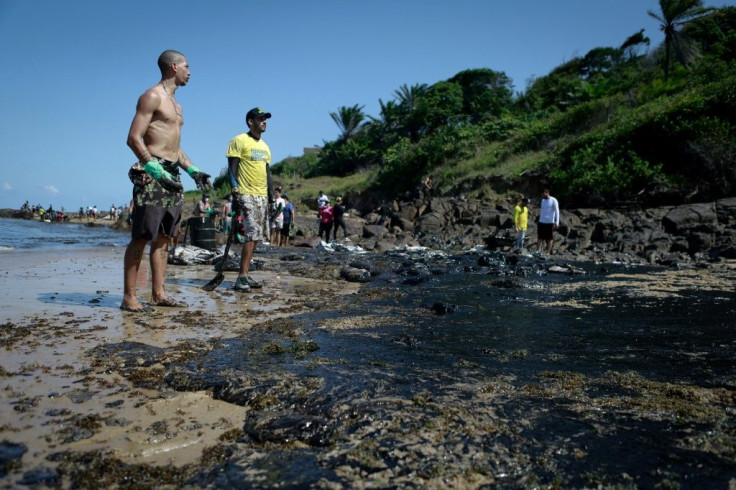Brazil Names Greek-flagged Tanker As Top Suspect In Oil Spills

A Greek-flagged tanker is the main suspect in oil spills that have been appearing along the coast of Brazil for two months, the defense ministry said Friday, finally lifting some of the suspense over this "environmental catastrophe."
The oil began appearing in early September and has been seen along a 2,000-kilometer (1,200-mile) stretch of the northeastern Atlantic coast.
The ministry said a search warrant for the unnamed ship had been issued while the attorney general's office said the damage to Brazil's coasts was "immeasurable."
Separately, police raided the Rio de Janeiro offices of a company linked to the owners of the ship, federal police said.
"This environmental catastrophe has reached estuaries, mangroves and river mouths all over northeastern Brazil, causing damage to fishing, aquaculture and tourism," the police said in a statement.
The defense ministry says the ship was transporting oil.
Investigators studied 1,100 ships navigating through the area before narrowing down the potential culprits to 30, and then settling on the Greek-flagged ship as the "prime suspect."
The ministry said in a statement it had compared satellite images from June 29 displaying "an oil spill" to others from earlier dates without the black mark.
It said the suspicious ship had not deactivated its satellite monitoring system and at no point had it communicated to Brazil's maritime authority information regarding a spill.
Brazil's navy, quoted by the federal police, said the ship was once detained for four days in the United States due to "anomalies ... in the system to separate water from oil to be discharged into the sea," in reference to the sludge that tankers are allowed to deposit in the high seas.
Police in Recife, northeastern Brazil, said the ship loaded its cargo in Venezuela before heading first to Singapore, South Africa and then Nigeria. It is currently off the coast of South Africa.
Investigations are ongoing to see if the spill was accidental or criminal, the ministry said.
Some 264 places across nine Brazilian states have been affected by the spill.
Many marine animals have died, including tortoises. Thousands of volunteers have mobilized to clean beaches with the tourist high season approaching rapidly.
The local economy has been badly affected.
"Everything has stopped, there are no fishermen at sea, no more fish for sale," said Sandra Lima, president of an association of 1,500 fishermen.
In any case, "people don't want to buy it any more as it may be contaminated."
The government of President Jair Bolsonaro, who has a poor record when it comes to environmental issues, has come under fire for taking 41 days to put into place an emergency action plan, according to an investigation by O Globo newspaper.
Worse still, Jorge Seif Junior, the aquaculture and fishing secretary, said on Thursday that "the fish is an intelligent animal, when it sees oil it swims away. So you can eat these little fish without any problems."
© Copyright AFP 2024. All rights reserved.





















